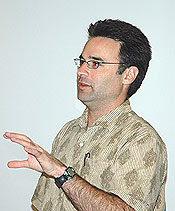Berkeleyan
A citizen journalist in Iraq
Dahr Jamail didn't like the news, so he went out and reported it himself
![]()
| 21 April 2005
 Dahr Jamail (Barry Bergman photo) |
He became a war correspondent.
"I definitely was scared, and I definitely knew it was a big risk and kind of a crazy thing to do," he admits, recalling his decision to experience firsthand the chaotic violence of post-Saddam Iraq. He remembers watching the Bush administration's "selling of the Iraq war" through America's news media, whose portrayal seemed dramatically at odds with what he was seeing and hearing from independent and foreign sources.
"I figured, well, media control is how they're doing it," he explains, "so I'll just go over there and try to report on it myself."
 Jamail posted this grisly gallery of snapshots on his website because, he says, "People need to see what war is." |
Speaking to a packed classroom in Etcheverry Hall last week, Jamail left little doubt those impacts have been devastating.
Despite what he called the "farce of an election" in January, Jamail said, the vast majority of Iraqis want the U.S. to leave. The reasons, he added, are all too obvious: Security remains inadequate, car bombs are "almost an everyday occurrence," and most of the country has electricity no more than three hours a day. With death and disease rampant, the healthcare system is in crisis, as hospitals grapple with shortages of medicine, supplies, and clean water, a lack of working equipment, and an ongoing "brain drain" of doctors fleeing the country for safety.
In Falluja, a stronghold of Iraqi insurgents where U.S. forces staged an all-out assault last November, conditions are far worse, Jamail said. Most of the city has been "bombed to the ground," he said, creating a massive refugee crisis in which "people with literally nothing" have nowhere to return to: "There's no water, no electricity, no jobs, and no reconstruction."
As he spoke, a slideshow of snapshots flashed on the wall behind him. Jamail took most of the photos, which featured sick and wounded Iraqis, refugee families, bombed-out neighborhoods, cement barricades, gas lines, overtaxed medical clinics. One image showed a woman whose face had literally melted, part of a grisly gallery of photos Jamail has posted on his website, dahrjamailiraq.com.
These photos were taken, he says, by an Iraqi who was allowed into Falluja to help bury the bodies after the U.S. assault. They show some of the victims - many of whom were women, children, and elderly - and were meant to enable survivors to identify their dead. The photos were circulating in villages around Falluja when Jamail came across them.
Outside the classroom, he is asked why he feels it's important that Americans see such horrific images.
"The same reason it was important for people to see images of what was really happening in Vietnam," he says. "People need to see what war is, they need to see the results of the Bush policy on the ground, what that looks like. Because this is what Iraqis are seeing all the time, this is what U.S. soldiers are seeing all the time. And this is what people back here never see."
The result, he acknowledges, is that the Bush administration is "definitely winning the information war right now." Far from conceding defeat, though, he's already raising funds for his next trip to Iraq.
"It's just the basic ideal of an informed citizenry as the basis of a democracy," he explains. "And we do not have an informed citizenry, and it's because of the media.. I think as a journalist, anyone who works there or in any war zone, you have to report on how this affects people. I mean, isn't that the story? So I feel beholden to do that."

